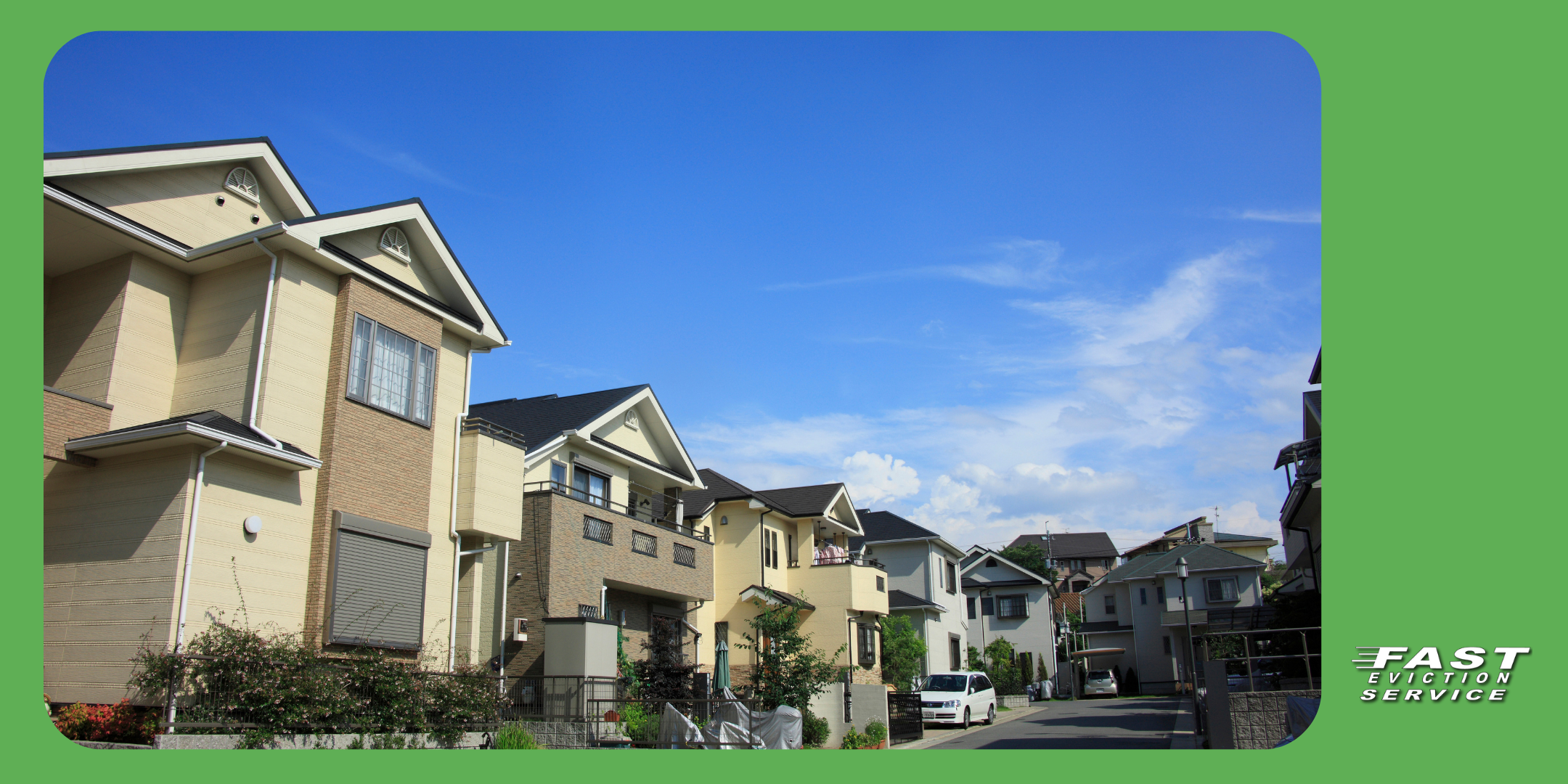You are represented at all times by one of our California Eviction Attorneys | 1-800-686-8686 | intake@fastevict.com | Se habla español
At Fault Evictions Los Angeles County
Updated 7/17/24
The moratorium prohibits almost all evictions without fault, but allows most evictions for a tenant’s wrongdoing, except for failure to pay rent if protected by the moratorium’s non-payment provisions. However, certain at-fault evictions are also prohibited under the moratorium, as explained below. The protections described in this section apply regardless of whether the tenant has experienced any COVID-19-related difficulties and regardless of their household income.

Causing Nuisance or Unauthorized Guests or Pets
Under the moratorium, evictions for having a nuisance or an unauthorized occupant or pet on the property are prohibited if they are a result of the COVID-19 pandemic. For instance, if the tenant is taking care of a sick person’s child or pet and that’s why there’s an unauthorized occupant or pet present. In such cases, the tenant cannot be evicted for violating the lease by having the unauthorized occupant or pet. The moratorium’s latest update clarified that this protection applies to occupants who have lived in the unit without permission between March 1, 2020 and January 20, 2023. Moreover, the amendment requires landlords to serve a 30-day notice to cure or quit instead of the standard 3-day notice before evicting tenants for unauthorized occupants who remain in the unit after the protection ends on March 31, 2023.
Deny Entry to Dwelling
Furthermore, the moratorium also states that a tenant cannot be evicted for refusing entry to their unit if the landlord’s attempts to enter are deemed as “harassment.” Although state law already prohibits the use of the right to enter as a means of harassment, the moratorium’s anti-harassment provisions define harassment broadly in terms of unit entry. It specifies that entries for inspections that are unrelated to necessary repairs or services, excessive in number, unfairly target specific residential tenants, intended to collect evidence against occupants, or exceed the limits of lawful entry are all considered forms of harassment.
Safety for Health and Safety Reasons
All of the limitations on evictions mentioned earlier are subject to a health and safety exemption. This exemption applies when an eviction is necessary to comply with habitability laws, another relevant law, or a government order that concerns the safety or habitability of the rental units. It also applies if the tenant’s occupancy poses a threat to public health or safety. This is a relatively limited exception, and therefore, the CAA suggests that landlords who wish to use it should consult with an attorney to ensure that they meet the criteria.
Late Fees and other Fees
Furthermore, the moratorium bars the imposition of late fees and interest while it is in effect. It is essential to note that this protection is not limited to tenants who have adhered to the moratorium’s provisions. Instead, it is a complete prohibition on late fees and interest throughout the duration of the moratorium.
Moreover, while the moratorium is in effect, it also prevents new pass-through charges, even if the County’s rent control ordinance typically permits such charges. This rule is only valid for units that fall under the County’s rent control ordinance.
Landlord Harassment and or Retaliation
Furthermore, the moratorium provides a comprehensive inventory of actions that landlords are not allowed to take as retaliation against residents who exercise their rights under the order. These forbidden actions are:
- Disrupting, ceasing, or neglecting to deliver all the housing services that the landlord is obligated to provide under the lease agreement or applicable federal, state, county, or local housing, health, or safety laws concerning the utilization or habitation of a rental unit, unless such housing services are closed due to Health Officer Orders.
- Neglecting to conduct necessary repairs and maintenance as stipulated in the rental agreement or mandated by federal, state, or local housing, health, or safety laws.
- Failing to exercise reasonable care in accomplishing repairs and maintenance once initiated or failing to adhere to appropriate industry repair, containment, or remediation protocols that aim to decrease exposure to noise, dust, lead, paint, mold, asbestos, or other building materials that may have adverse health effects.
- Exploiting the landlord’s access rights to a rental unit, such as carrying out excessive entries, entries that improperly target specific tenants, or entries used to gather evidence against occupants. This also includes entries for inspections that are unrelated to necessary repairs or services, or beyond the scope of a lawful entry.
- Engaging in verbal abuse towards a tenant using offensive language that is likely to provoke an immediate violent response. This can include verbal communication during in-person conversations, social media posts or messages, or other forms of communication.
- Attempting to force or intimidate a resident to leave their rental unit through deceit, intimidation, or coercion, which can include threats to report the resident to government agencies like the United States Department of Homeland Security or law enforcement.
- Making verbal or nonverbal threats of physical harm to a resident.
- Engaging in any actions that violate laws prohibiting discrimination on the basis of race, gender, sexual preference, sexual orientation, ethnic background, nationality, religion, age, parenthood, marriage, pregnancy, disability, HIV/AIDS, occupancy by a minor child, or source of income.
- Initiating or attempting to initiate any action to terminate a tenancy, including serving any notice to quit or eviction notice, or filing any legal action to regain possession of a rental unit based on false or groundless claims that the landlord has no reasonable cause to believe are true or are legally justifiable based on the facts known to the landlord. However, landlords shall not be held liable under this provision for initiating an action to regain possession until the resident has obtained a favorable termination of the action.
- Unauthorized removal of personal property, furnishings, or any other items from the rental unit without prior written consent of the resident, except as required by law to enforce a legal termination of tenancy.
- Repeatedly offering payments to a resident to vacate within a six-month period, after the resident has explicitly informed the landlord in writing that they do not wish to receive any further offers to vacate in exchange for payment.
- Making offers of payment to vacate accompanied by threats or intimidation, with the intent of coercing a resident to vacate, is prohibited. However, this does not include settlement offers made in good faith without threats or intimidation in eviction actions that are pending.
- Failing to acknowledge receipt of a tenant’s lawful rent payment.
- Delaying cashing a rent check for more than thirty (30) days without a valid reason;
- Asking for information that infringes on a resident’s right to privacy, such as their residency or citizenship status, protected class status, or social security number, except when legally mandated or when necessary to assess tenancy qualifications. Furthermore, it is prohibited to disclose such information except when required or authorized by law.
- Interfering with a resident’s right to privacy, including but not limited to, entering or photographing areas of a rental unit that are beyond the scope of a lawful entry or inspection.
- Repetitive acts or omissions that significantly interfere with the peace, quiet, comfort, or repose of any occupant legally entitled to reside in the rental unit, and that are intended to force them to vacate or surrender their occupancy rights.
- Removing a Housing Service with the intention of forcing a resident to vacate the rental unit, such as revoking a parking space even when the landlord knows that the resident won’t be able to find an alternative parking spot and will have to move out.
- Preventing a resident from exercising their right to organize with other tenants and engage in collective actions for mutual aid and protection; denying access to tenant organizers, advocates, or representatives working with or for tenants at a property; denying tenants the use of appropriate spaces to hold meetings as provided in their rental agreement; or prohibiting the distribution and posting of literature in common areas such as lobby areas and bulletin boards that informs other tenants of their rights and opportunities to participate in communal activities.
If you have any additional questions regarding at fault eviction protections for tenant sin LA County, please contact us to talk to an eviction specialist.




